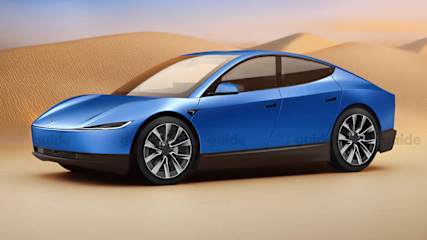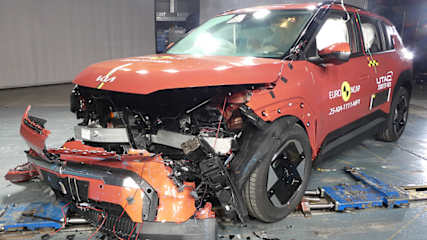Tesla Model 3 News
.jpg)
Tesla's game-changing new feature is here
Read the article
By Jack Quick · 18 Sep 2025
Tesla has officially launched its Full Self-Driving (Supervised) semi-autonomous driving function in Australia and New Zealand and it’s now available for public use.Australia and New Zealand are the first right-hand drive markets to receive FSD (Supervised). The EV carmaker had previously only offered it in left-hand drive markets, like the US.In order to use this technology you need to own a Tesla Model 3 or Model Y with the newest Hardware 4 (HW4) camera system.You also need to have purchased the $10,100 FSD (Supervised) package. A subscription option is also coming soon for $149 per month for eligible vehicles.If both of those boxes have been ticked, eligible customers will be able to enable FSD (Supervised) with an over-the-air (OTA) update when connected to WiFi.Using the on-board Tesla Vision surround-view camera system and a neural network, FSD (Supervised) “attempts” to drive to destinations by following road curves, stopping and negotiating intersections and roundabouts, making left and right turns.It’s also able to stop at traffic lights and stop signs, plus it reacts to other vehicles, pedestrians and cyclists on the road.Like regular adaptive cruise control, it’s able to keep a set distance between a car in front. However, the system is able to conduct lane changes as well.Tesla stresses that FSD (Supervised) “does not make the vehicle autonomous” and it’s a “hands-on feature” that requires you to be fully attentive behind the wheel. You need to be ready to take immediate control of the vehicle.The car uses its cabin camera to read how much attention the driver is paying to the road ahead.Tesla claims it doesn’t require full visibility of the driver’s eyes in order to monitor attentiveness. This means the system stays fully active while wearing sunglasses, for example.If the cabin camera can’t see the driver’s hand and arm locations, the central touchscreen will prompt the driver to periodically apply slight force to the steering wheel.If a driver repeatedly looks away from the road, prompts will play saying to pay attention to the road. If these are ignored, they escalate in intensity, then display an alert message saying FSD (Supervised) is unavailable for the current drive.In the worst case scenario, the car will sound a continuous chime, turn on the hazard lights and bring the car to a complete stop.Tesla notes that drivers can be suspended from using FSD (Supervised) if improper use is detected. Five strikes are granted.At this stage Tesla hasn’t detailed how older vehicles will be able to receive FSD (Supervised) approval despite owners being able to buy the package for years. It’s likely a retrofit option will be offered eventually.Test drives of Tesla Model 3 and Model Y examples with FSD (Supervised) are now available at Tesla dealers around Australia.
.jpg)
Huge change coming to Australian roads soon: Tesla about to launch Full Self Driving (Supervised) Down Under and we've tested it in a 2026 Tesla Model 3
Read the article
By Dom Tripolone · 29 Aug 2025
The future is here and it’s going to blow your mind.
Tesla is about to launch its Full Self Driving (Supervised) in Australia, and CarsGuide was among the first people to trial it on Australian roads.
.jpg)
Tesla’s big backflip! Popular electric sedan regains a feature virtually every car has, but will this subtlety updated 2026 Tesla Model 3 come to Australia?
Read the article
By Jack Quick · 20 Aug 2025
It seems Tesla is listening to customer feedback after all and is willing to right its wrongs.
.jpg)
'For your safety we strongly advise against it': The bonkers Tesla Model Y and Model 3 safety warning you probably don't know about
Read the article
By Andrew Chesterton · 28 Jul 2025
Tesla has issued a warning to Australian owners about driving their vehicles through tunnels with the cruise control system activated, warning that it is a “known-limitation” of the model’s Traffic-Aware Cruise Control.
The situation came to light most recently through user complaints of phantom braking when the cruise system is active in a tunnel, with a complaint to Tesla eliciting the warning. It is also included in Tesla’s user manual.

Tesla demolishes Chinese brands in Australia: US electric car brand posts best sales in Australia this year with the updated 2025 Tesla Model Y only outsold by the Toyota HiLux and Ford Ranger
Read the article
By Jack Quick · 03 Jul 2025
Tesla has clawed itself out of its sales slump in Australia, achieving its best monthly sales figure in the past 12 months.
.jpg)
'Misleading': Tesla autopilot slammed by European safety authority, with the tech found in the popular 2026 Tesla Model 3 and Model Y hit for its middling performance
Read the article
By Tom White · 05 Jun 2025
Euro NCAP’s Technical Manager of Assisted Driving Systems, Adriano Palao, has criticised Tesla’s autopilot software, going so far as to say the suite is “misleading consumers about the system’s capabilities”.The fresh retort of Tesla’s autonomous driving technology comes as Euro NCAP detailed the differences in a variety of similar systems on the market, noting “some systems are more user-centric and safe than others”.Performance testing for the Model S - which is no longer sold in Australia - had the safety body determining that it performed poorly awarding it just 30 per cent for its Assistance Competence score.The Assistance Competence score ranks autonomous features for their performance, clarity of information, how they communicate capability limitations, driver monitoring, and driver collaboration. It is distinguished from the Safety Backup score, which ranks how the systems avoid a collision in a variety of situations, as well as when a sensor is blocked or the driver is unresponsive.The body noted it was jarring the Model S scored an Excellent 94 per cent for its Safety Backup score, but just 30 per cent for Assistance Competence.Euro NCAP said not only does Tesla name the system Autopilot and suggest full automation in its promotional material, but also noted the system’s steering input was resistant to driver attempts to override it, and upon doing so, the entire system automatically disengages, “limiting its usefulness”.The body also noted issues with the centrally-mounted touchscreen, in that the driver had to take their eyes off the road to view alerts.Euro NCAP ultimately said: “Tesla is misleading consumers about their autopilot system’s capabilities simply through its name and marketing, which could have potential safety implications.”Tesla was not the only company marketed on its safety credentials who came under fire in the latest round of autonomous system testing. Even Volvo’s new EX30 crossover was in the firing line, with the safety body earmarking similar concerns about its autonomous driving tech.The EX30 performed better than the Tesla in the Assistance Competence score, landing at 62 per cent, although was marked down for similar reasons to the Model S, it recorded a score less than the Tesla for its Safety Backup, at 72 per cent.Both cars, alongside the MG ZS, were awarded an overall Moderate rating for their active safety suites. Other cars considered in the round of testing included the Kia EV3, Porsche Macan, and Toyota bZ4X, all of which received a Very Good overall score, while the Mazda CX-80 and Xpeng G9 recorded a Good overall rating.Euro NCAP’s latest round of autonomous driving feature testing comes as the technology proliferates across a much wider spectrum of the market. Many brands now spruik some level of autonomous driving through an advanced cruise control suite, although as Euro NCAP notes, not all of these systems are created equal, and just ticking feature boxes does not always result in a safer system.In addition to more thorough testing of autonomous driving systems, Euro NCAP will also include standards for automakers to include physical buttons and dials from 2026, labelling the overuse of touchscreens an “industry-wide problem, raising the risk of distraction crashes”.Euro NCAP said the new protocols will encourage manufacturers to use separate, physical controls for basic functions in an intuitive manner, limiting eyes off-road time and therefore promoting safer driving.Under the new protocols, cars will be marked down by not including physical switches for indicators, hazard lights, the horn, operating windscreen wipers, and activating the SOS function.

$40,000 Tesla Model 2 existed and was personally cancelled by Elon Musk despite denials, confusing Tesla executives and investors as 2025 MG4 and BYD Dolphin-rivalling car is a no show | report
Read the article
By Tom White · 04 Jun 2025
Musk's erratic communications surrounding low-cost models caused confusion within Tesla and with investors according to a new report.

Trio of big name electric cars smash safety testing: 2025 Tesla Model 3, Kia EV3 and MG S5 EV all achieve coveted five-star rating
Read the article
By Samuel Irvine · 23 May 2025
ANCAP, Australia’s crash-testing authority, has awarded five-star safety ratings to the Tesla Model 3 and new Kia EV3 and MG S5 EV.
.jpg)
Tesla's cheapest EV gets range boost for free: 2025 Tesla Model 3 RWD receives bigger battery from the 2025 Tesla Model Y RWD to cement its lead over the 2025 BYD Seal
Read the article
By Jack Quick · 19 May 2025
Tesla has quietly increased the range of its entry-level Model 3 electric sedan for no extra charge.
.jpg)
Alert! Tesla's Full Self Driving lands on Australian roads as testing commences in Melbourne for the future self driving technology available on the 2025 Tesla Model Y and Tesla Model 3
Read the article
By Samuel Irvine · 19 May 2025
For Melbourne drivers who hate those pesky CBD hook turns, Tesla may have found you a solution. That is, if you’re willing to put your life into the hands of computer software.




